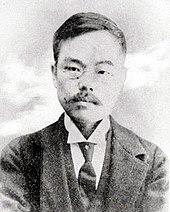Oguri Fuyō
Oguri Fuyō ( Japanese 小 栗 風葉 , actually Oguri Isoo (小 栗 磯 夫); born February 3, 1875 in Handa (半 田 町), Chita County (知 多 郡) in Aichi Prefecture ; died January 15, 1926 ) was a Japanese writer of the Meiji and Taishō periods .
life and work
Oguri Fuyō was born the son of a village pharmacist. He became interested in books at an early age, but did not succeed in studying literature. In 1891 he joined a group of writers who called themselves "Ken'yū-sha" (勧 誘 社). His first successes came in the years 1896 to 1897 with a series of melodramatic-romantic family stories, such as "Neoshiro" (寝 白粉) and "Kikkō-zuru" (亀 甲 鶴), which deal with sex, love and suicide. After 1900 he turned to naturalism and wrote more realistic stories.
"Youth" (青春, Seishun), which appeared in three sequels from 1905 to 1906, and in which Oguri was heavily based on Turgenev's " Rudin ", is considered his best work. Oguri is remembered for his lively style and, encouraged by his role model Ozaki Kōyō , for his contributions to the development of Japanese fiction.
Remarks
- ↑ This is the white make-up that is put on at night.
- ^ The Iwanami publishing house brought the book out again in 1953 in three volumes.
literature
- S. Noma (Ed.): Oguri Fuyō . In: Japan. An Illustrated Encyclopedia. Kodansha, 1993, ISBN 4-06-205938-X , p. 1132.
| personal data | |
|---|---|
| SURNAME | Oguri, Fuyō |
| ALTERNATIVE NAMES | 小 栗 風葉 (Japanese) |
| BRIEF DESCRIPTION | Japanese writer |
| DATE OF BIRTH | February 3, 1875 |
| PLACE OF BIRTH | Aichi prefecture |
| DATE OF DEATH | January 15, 1926 |
